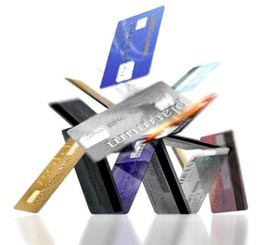|
|
| Help | |
| You are here: Rediff Home » India » Get Ahead » Money » Manage |
|
| |||||||||||||||||||||||
|
| |||||||||||||||||||||||

 hances are some sales agents have called you pleading with you to take a credit card.
hances are some sales agents have called you pleading with you to take a credit card.
"It's free. No entrance fee. No annual charge," is the sales pitch.
But you already having a debit card, you say. After all, who wants too many cards in their wallet?
Incidentally, do you even know the difference between the two (debit and credit card)?
Get a grip on that before you turn down an offer.
Credit or Charge?
The credit card and charge card operate the same way. Both these pieces of plastic enable you to buy now and pay later at no extra cost.
The charge card differs from its credit counterpart in two ways.
~ How much you can spend
The credit card will come with a spending limit (known as the credit limit). The bank issuing the card decides the limit -- it depends on your income, the type of card you have (Classic or Gold) and your repayment patterns.
The higher the income, the greater the limit.
The more expensive the card (Gold), the higher the limit than a Classic.
The more regular you are with your payments, the higher the chances of getting your credit limit upped.
Say your credit line is Rs 40,000. This means you cannot spend more than that on your card in a month. To do so, you will have to call your bank and request them to increase your limit for that month. If it is an emergency, they will.
On a charge card, there are no such hassles. There is no cap on how much you can spend (that is why it is given only to select customers). With no limit to your spending, your only obligation is to clear the entire amount that appears in your billing statement.
Which bring us to the next issue.
~ How the bill is settled
With a charge card, you have to pay the entire amount when the bill is presented to you at the end of the month. Not so if you have a credit card.
In the case of a credit card, you can pay just 5% of your bill amount and carry forward the balance to be paid the next time. You do not have to settle all in one go. This is referred to as revolving credit.
Credit or Debit?
Your debit card is like an ATM card on the move. Just like you use your ATM card at any ATM to get instant cash, you can use your debit card at any place (like a credit card).
The major difference: in a debit card, the money is directly pulled out from your account.
In technical terms, no free credit line.
A credit card requires the bank to make a payment to the merchant establishment (shop, hotel or wherever you spend money using your card). The cardholder has to settle the bill later.
Not so in the case of a debit card. Here, the amount is deducted immediately from your bank account.
The merchant establishment will have a debit terminal. When you give your card to make the payment, the card will be swiped. The moment it is done, an electronic message is sent to the bank which checks to see if the customer has that much money in his/her account.
If yes, the amount is debited (taken) from the customer's account and credited (added) to the merchant's account simultaneously.
Incidentally, all this takes place in seconds.
The common denominator of all the cards is that you can use them instead of cash to make payments.
The difference lies only in the amount you can spend on the card, and how the bills are settled.
The most well known charge cards in the market are The Citibank Diners and the Amex from American Express.
Most banks now come out with just one card which doubles as an ATM card and a debit card.
Convenience at your fingertips, literally.
Next: Which one is for you?
DON'T MISS!
� Are you revolving on your credit card?
� Want a free credit card?
Image: Uday Kuckian
|
|
| © 2008 Rediff.com India Limited. All Rights Reserved. Disclaimer | Feedback |